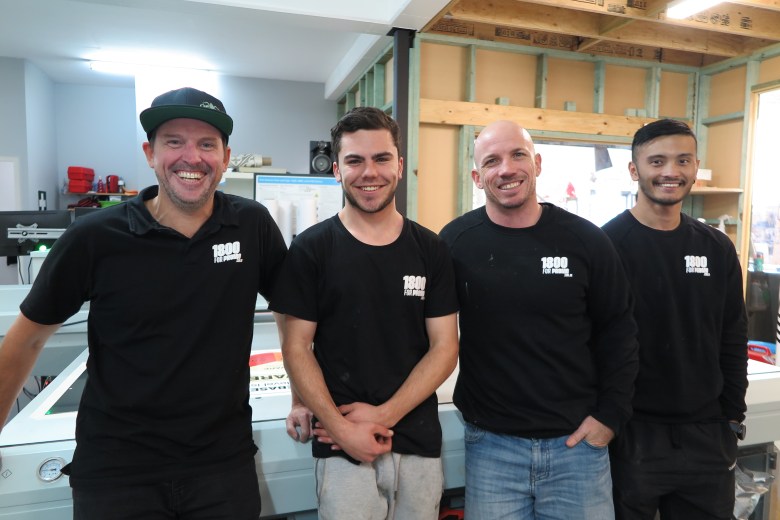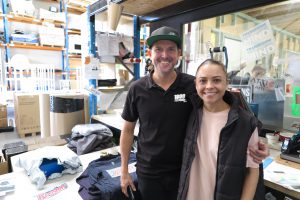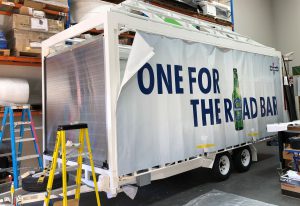
When Ben Browning started 1800 for Promo in 2006 garment and promotional product printing was its mainstay. But since then his business, in Sydney’s Sutherland Shire, has added signage and branded custom fabrications to its repertoire.
1800 for Promo can best be described as eclectic with Browning and his team always ready to adapt existing printing equipment to see if it can produce something new.
Printing standard promotional products like USB sticks, pens, mugs and uniforms has been 1800 for Promo’s traditional bread and butter.
But through a preparedness to have a go, stay nimble and think creatively, this offering has broadened out in a variety of directions and now includes building roadworthy promotional trailers that are towed around the country and used as a promotional tool.
It all started a few years when Browning was tasked with building a kitchen for a McDonald’s restaurant.
Last year 1800 for Promo won a contract to supply customised wall tiles, tableware and other promotional items to 120 Oporto stores nationally.
When ProPrint visited a trailer was being kitted out and was on the way to becoming a fully operational Heineken mobile bar, complete with beer fridges and bar stools.
So, what does this have to with print you may ask?
Well, quite a lot actually.
The trick with these projects is being able to create a finish that looks authentic without being too heavy and be easy to clean.
Not being able to find another printer doing this type of work, Browning put on his thinking cap and decided to give it a crack.
And so began Browning’s inquiry into UV flatbed printers and how to print a raised finish.

His quest led him to invest in an Océ Arizona 1280 GT UV flatbed that can handle flexible and rigid substrates.
This coincided with an ongoing collaboration with Océ as Browning set about perfecting how to print 2.5D on substrates including ceramic tile, plastic, aluminium and wood using Océ’s Touchstone software.
“We were willing to have a go and do it,” Browning told ProPrint.
“It is very time consuming and there are a lot of mistakes. It costs lots of money doing the sampling. There are not a lot of people that are prepared to do this type of work.”
Browning worked from knowing UV printing would create texture and then experimented with applying multiple coats to increase the texture.
“I just knew there was more that could be done,” he said.
But there were also risks with the experiment.
“As you build layers the height of the substrate rises and the heads are prone to hitting the job,” he said.
“If you hit the job the job’s wrecked. If you hit the substrate the heads are wrecked.
“There is a lot of risk involved. It is not a simple process of just doing it.”
Browning said the McDonald’s kitchen involved printing aluminium composite panels to look like tiles and be easy to clean.
It was a similar process with Oporto. Oporto wanted an authentic style that would promote a distinctive Portuguese feel in the restaurants.
To achieve this a series of ceramic wall tiles were printed in a variety of patterns on the UV flatbed with a 2.5D raised finish and were rolled out at the beginning of this year.
Braille signage is another area where this type of printing is in demand.
The Heineken trailer complies with all building codes and uses elements ranging from the 2.5D printing to electricals, refrigeration, metal roofing and lighting to finally come together.

“We are using powder coated aluminium to get a porcelain look to the aluminium sheets and then use the UV print to create texture on the tile and give the illusion that it is not printed,” Browning said.
Starting a business in 2006 shortly before the global financial crisis swept the world would be considered to be one of the toughest challenges a person could face.
But it didn’t end there for Browning.
Small to medium sized businesses share a common refrain on the challenges faced with finding skilled staff, not having time and working hard to keep clients happy key issues.
This is certainly true for Browning. Finding and retaining staff who can operate the Océ, a Roland roll to roll printer and a CNC cutter and also deal with problems has proven challenging.
Added to this the 43-year-old discovered in February 2019 that the reason why his back had been sore was that he had a tumour growing from his lower spine.
Receiving a bone cancer diagnosis was obviously a major blow for Browning.
But he is very hopeful that after 25 days of radiation he is on the road to recovery.
“It’s been a really tough start to the year and a big challenge but I am just dealing with it,” Browning said.
“We’ve had our whole Oporto installs happening nationally and we’ve had to do that while going through the transition of staff and my illness.”
Earlier this year Browning employed a new production manager and is now looking for another one.
“We are all about training our staff and retaining them,” he said.
“We are trying to employ skilled staff right now. There is definitely a limitation to finding skilled staff in our industry,” he said.
A lack of formal training is a broad problem in the printing industry.
“I’ve been at the point where I’ve employed qualified signwriters and they don’t know how to use machines,” Browning said.
“In the signage industry you need to be able to print with flat bed and roll to roll printers.
“You need to be able to use CNC machines.
“You need to be able to use machinery that creates signs. If you can’t use the machine that creates signs, then how are you going to make them?”
To further streamline and grow his business, Browning regularly meets with business coach Steve Kay.
Coming out of these sessions has been the installation of large televisions in all work areas so it is easy for all staff to see where jobs are up to.
“Steve can’t manage me in an ordinary way,” Browning said.
“He understands there are things happening all the time and fires that need to be put out and it’s not a straight-forward business because the work we do is so eclectic.”.
Browning has traversed many career paths so far.
He completed his apprenticeship as a mechanic before starting a record store at a Sydney skate park.
From there he got into action sports and started building skateboard ramps and setting up signage for motocross which gave him the eye for knowing what marketers wanted product signage to achieve.
All of these paths have taken him to where he is now and who knows what he will throw into the mix next.
Want to know more – visit https://www.1800forpromo.com.au/
Comment below to have your say on this story.
If you have a news story or tip-off, get in touch at editorial@sprinter.com.au.
Sign up to the Sprinter newsletter
